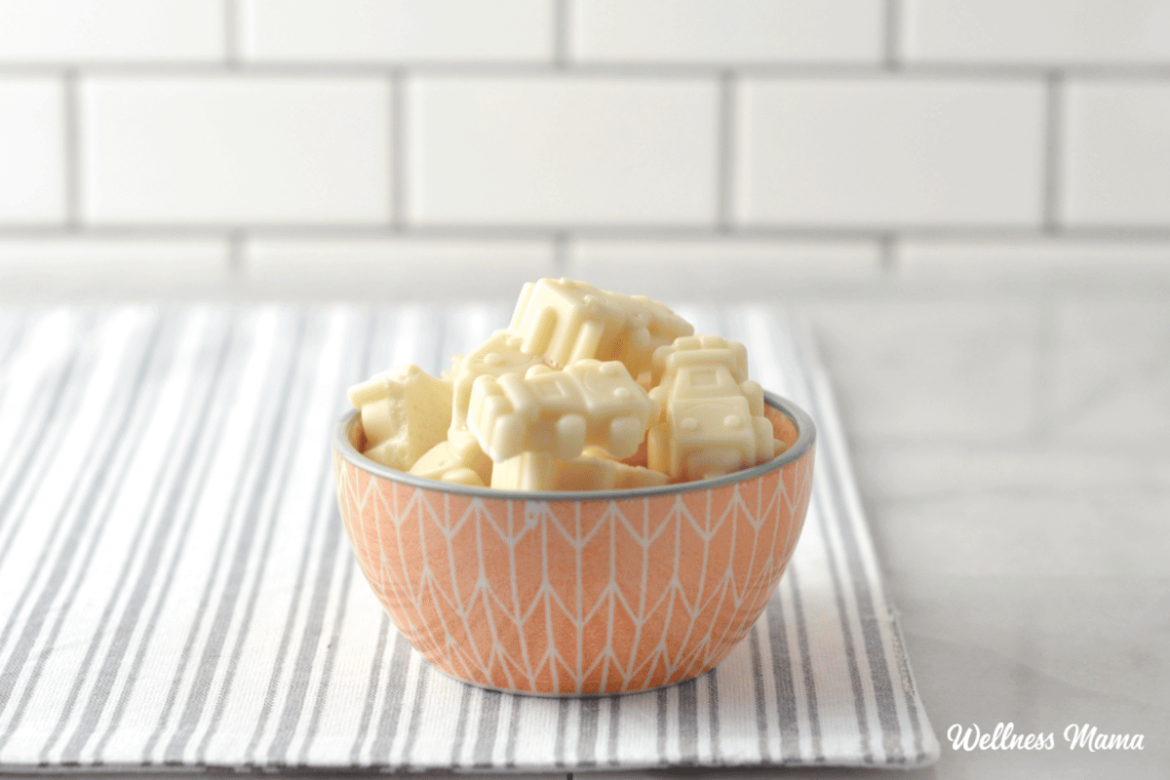I’ve been on a gummy kick lately as a fun and tasty way to increase our nutrient intake. While I’ve made healthy gelatin in different ways over the years, I wanted to add a new one to the mix. These magnesium gummies taste like lemon, are a hit with kids, and have all the benefits of magnesium.
Let’s Talk About Magnesium Gummies
Most gummy vitamins on the market are full of sugar like glucose syrup or even high fructose corn syrup. And the sugar-free versions are often loaded with artificial sweeteners. They may be labeled non-GMO, gluten-free, and all the things, but there are still plenty of not-so-great ingredients hiding in them.
If you’re looking for chewable, great-tasting magnesium supplements, they’re hard to find.
Thankfully though they’re not hard to make! These magnesium citrate gummies get their natural flavors from lemon juice and honey. No artificial flavors in these gummy supplements.
Because the ingredients are safe I don’t feel the need to keep them out of reach of children. Unlike some store-bought dietary supplements. Although you might find they disappear quickly if they’re left out!
Magnesium Benefits
I’ve already covered why we need magnesium and how we’re likely not getting enough. Lots of times. But it’s worth repeating. Many multivitamin supplements focus more on calcium than magnesium. And food doesn’t have the same nutritional value it used to. I’ve heard from many readers that simply maximizing their magnesium levels has helped their health immensely.
There are many different types of magnesium and ways to get it. My kids use topical magnesium at night before bed. And my older kids and I take magnesium supplements. I like to have a variety of sources for maximum absorption.
Magnesium is great for the nervous system, better sleep, pain reduction, muscle health, and so much more. It’s generally calming and relaxing, so most people like to take it at night. Since I’m an inverse modulator, I find it energizing so I take mine in the mornings.
Magnesium Citrate
As I said, there are lots of different types of magnesium. Some better than others. These gummies specifically use a type called magnesium citrate. You’ll find it in supplements like raspberry lemon flavored Natural Vitality Calm and calm gummies. It’s also what I use in my homemade electrolyte drink.
Studies show it’s better absorbed than magnesium oxide. Plus it’s considered safe for children, during pregnancy, and breastfeeding.
Much of the research around magnesium citrate focuses on its ability to help with constipation. It’s often used before a colonoscopy to help someone clear out. Lower doses can help with regularity. Animal studies show it can help reduce pain levels. Overall magnesium is helpful for brain inflammation, mental health, and helping us mentally wind down.
Citrus Magnesium Gummies
The other ingredients in these gummies are also calming. Gelatin naturally has amino acids like proline and glycine that help relax the body. Some gummies rely on agar or pectin to thicken them, but I really like including gelatin for its health benefits.
I also use a combination of honey and salt here. While it enhances the flavor, salt also helps lower cortisol and balance blood sugar at night. The gummies are sweetened with honey, which helps lower cortisol levels to reduce stress. As a carb, honey can also help with melatonin levels for better sleep. I talk more about all that in this post.
How Much Magnesium?
Too much magnesium citrate can cause diarrhea, but otherwise, I don’t worry too much about dosage. The food and drug administration recommended daily value for magnesium ranges from 75 mg of magnesium for infants, to 420 mg for men. Keep in mind this is the base level to avoid serious issues, not for optimal health. Dr. Mark Hyman recommends up to 1,000mg for adults and 400-500 for kids.
Each serving size of these vitamin gummies has a little less than 100% of the daily value of magnesium. Enough to get the benefits, but not too much to cause diarrhea. If you start to have loose stools from them though, then use less.

Lemon Magnesium Gummies
These delicious magnesium gummies are naturally flavored with lemon and honey. Great for a relaxing evening treat!
-
Pour the water and lemon juice into the saucepan.
-
Evenly sprinkle the gelatin and magnesium on top of the liquid and let it rest.
-
Once the mixture has bloomed and absorbed, add the rest of the ingredients.
-
Turn the stove onto medium-low heat and gently whisk the gelatin mixture. Don’t over stir or it will get really foamy.
-
Once it’s completely melted and combined, pour the mixture into your molds of choice. You can use silicone molds for fun shapes, or a square glass baking dish.
-
Place the magnesium gummies in the fridge for several hours or until firm. Cut into 9 squares.
Nutrition Facts
Lemon Magnesium Gummies
Amount Per Serving (1 serving)
Calories 53
% Daily Value*
Fat 0.03g0%
Saturated Fat 0.01g0%
Polyunsaturated Fat 0.003g
Monounsaturated Fat 0.004g
Sodium 19mg1%
Potassium 15mg0%
Carbohydrates 8g3%
Fiber 0.05g0%
Sugar 8g9%
Protein 6g12%
Vitamin A 1IU0%
Vitamin C 4mg5%
Calcium 6mg1%
Iron 0.1mg1%
* Percent Daily Values are based on a 2000 calorie diet.
- Storage: These keep best in the fridge in an airtight container
- Dose: Since these are food-based I don’t “dose” them like medicine. However, each serving size has about 450mg of magnesium. In general, 1 square is enough for children, and 2 for adults, but you could easily cut the magnesium added in half if desired.
More Healthy Gummy Recipes
Looking for some more delicious gummy recipes? Here are some of our favorites!
What’s your favorite way to take magnesium? Leave a comment and let me know!
- Koc, B., Kizildag, S., Hosgorler, F., Gumus, H., Kandis, S., Ates, M., & Uysal, N. (2021). Magnesium Citrate Increases Pain Threshold and Reduces TLR4 Concentration in the Brain. Biological trace element research, 199(5), 1954–1966.
- Walker, A. F., Marakis, G., Christie, S., & Byng, M. (2003). Mg citrate found more bioavailable than other Mg preparations in a randomised, double-blind study. Magnesium research, 16(3), 183–191.
- Magnesium Citrate. (2022). In Drugs and Lactation Database (LactMed®). National Institute of Child Health and Human Development.
